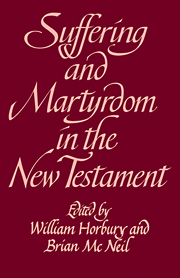 Suffering and Martyrdom in the New Testament
Suffering and Martyrdom in the New Testament Book contents
- Frontmatter
- Contents
- Abbreviations
- G. M. Styler and the Cambridge New Testament Seminar
- 1 Introduction
- 2 Did Jesus teach that his death would be vicarious as well as typical?
- 3 Imitatio Christi and the Lucan Passion narrative
- 4 The persecution of Christians in John 15: 18–16: 4a
- 5 Interchange and suffering
- 6 On the interpretation of Colossians 1: 24
- 7 Preparation for the perils of the last days: 1 Thessalonians 3:3
- 8 Maintaining the testimony of Jesus: the suffering of Christians in the Revelation of John
- 9 Martyrdom and inspiration
- 10 Suffering and martyrdom in the Odes of Solomon
- 11 Suffering and messianism in Yose ben Yose
- 12 What might martyrdom mean?
- Index of authors
- Index of references
- Index of subjects
10 - Suffering and martyrdom in the Odes of Solomon
Published online by Cambridge University Press: 26 February 2010
- Frontmatter
- Contents
- Abbreviations
- G. M. Styler and the Cambridge New Testament Seminar
- 1 Introduction
- 2 Did Jesus teach that his death would be vicarious as well as typical?
- 3 Imitatio Christi and the Lucan Passion narrative
- 4 The persecution of Christians in John 15: 18–16: 4a
- 5 Interchange and suffering
- 6 On the interpretation of Colossians 1: 24
- 7 Preparation for the perils of the last days: 1 Thessalonians 3:3
- 8 Maintaining the testimony of Jesus: the suffering of Christians in the Revelation of John
- 9 Martyrdom and inspiration
- 10 Suffering and martyrdom in the Odes of Solomon
- 11 Suffering and messianism in Yose ben Yose
- 12 What might martyrdom mean?
- Index of authors
- Index of references
- Index of subjects
Summary
It has been my privilege and my pleasure to know Geoffrey Styler for the past ten years, as a priest, a teacher and a scholar, and above all, as a friend of unfailing sensitiveness and delicacy of character. It is my aim in this short study to help round off the historical part of this tribute to him by pointing to something of the earliest developments of Christian reflection on martyrdom and suffering in the period after the writing (but before the canonisation) of the New Testament documents studied by other contributors. The most important texts of the second century for this question are well known: the letters of Ignatius of Antioch, the Martyrdom of Polycarp of Smyrna, the Acts of Justin and his companions, the accounts by Hegesippus of the persecution of the early leaders of the Church in Jerusalem, the Letter of the Churches in Gaul about the persecution there, the Acts of the Scillitan Martyrs, and the recently-discovered Second Apocalypse of James. Light has been thrown on some of these texts in the previous contribution, and instead I shall discuss a body of literature that has not been much considered in this context, the Odes of Solomon.
The Odes contain, on first inspection, little that has to do with Christian suffering. The references to the ‘war’ for which the believers must be prepared (Odes 8.7; 9.6ff) undoubtedly speak of a real conflict with human adversaries, but this is a ‘war’ fought against heretics (as in Odes 18 and 38), and the odist expects that he will conquer (cf. Ode 29.8–10).
- Type
- Chapter
- Information
- Suffering and Martyrdom in the New TestamentStudies presented to G. M. Styler by the Cambridge New Testament Seminar, pp. 136 - 142Publisher: Cambridge University PressPrint publication year: 1981


